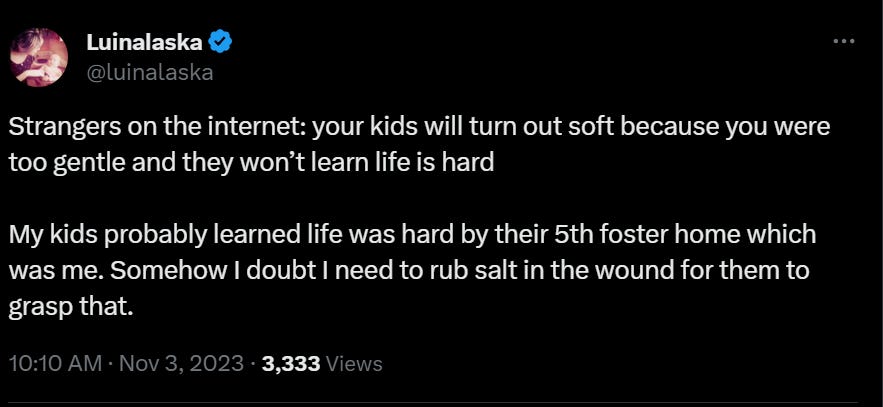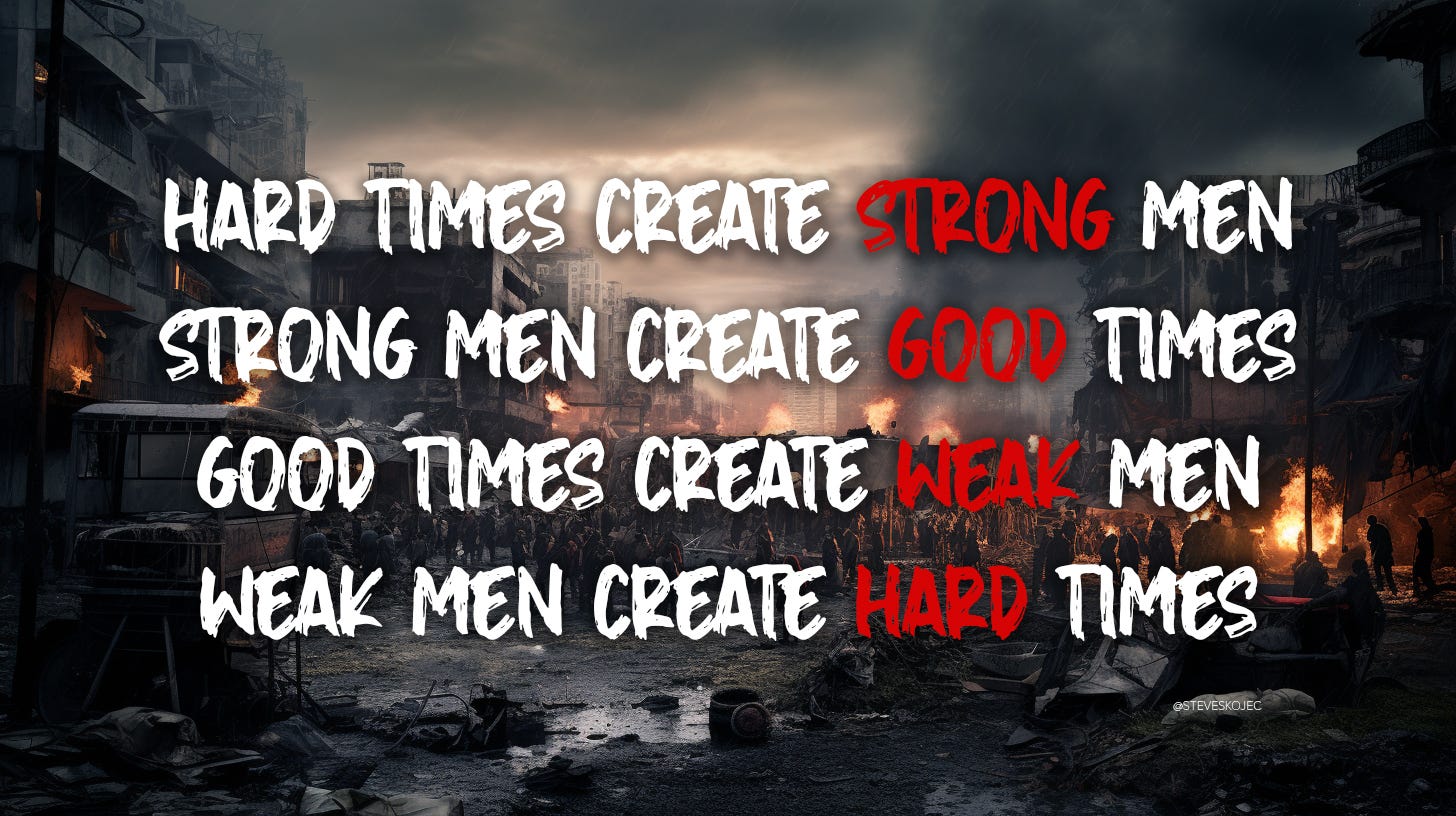Bread, Not Stones
Imposing Suffering on Your Kids Might Make Them Stronger, But is it Worth It?
If you spend any time on the Social Platform Formerly Known as Twitter, there’s a lady called Luinalaska who is absolutely worth a follow. Wise and funny beyond her years, and ferocious in the love of her family, she’s a character you can’t help rooting for.
Lu started a firestorm yesterday with a simple statement about one of her sons:
Of course, immediately came the accusations that she’s letting her kid freeload and is going to make him yet another leech on society. She had no problem pushing back on that right away. Especially because some of her kids came through the foster care system before she was able to adopt them:
She also took a swipe at a particularly cringe-tastic opinion from a guy who was virtue signaling about how hard it is to make sure his kids don’t inherit any of the privileges their parents worked hard to obtain:
Finally, today she summed things up with this:
In his book, 12 Rules for Life: An Antidote to Chaos, Jordan Peterson addresses the tension between protecting your kids from harm and making them strong enough to overcome it:
There is simply no way to wall off some isolated portion of the greater surrounding reality and make everything permanently predictable and safe within it. Some of what has been no-matter-how-carefully excluded will always sneak back in. A serpent, metaphorically speaking, will inevitably appear. Even the most assiduous of parents cannot fully protect their children, even if they lock them in the basement, safely away from drugs, alcohol and internet porn. In that extreme case, the too-cautious, too-caring parent merely substitutes him or herself for the other terrible problems of life. This is the great Freudian Oedipal nightmare. It is far better to render Beings in your care competent than to protect them.
And even if it were possible to permanently banish everything threatening—everything dangerous (and, therefore, everything challenging and interesting)—that would mean only that another danger would emerge: that of permanent human infantilism and absolute uselessness. How could the nature of man ever reach its full potential without challenge and danger? How dull and contemptible would we become if there was no longer reason to pay attention? Maybe God thought His new creation would be able to handle the serpent, and considered its presence the lesser of two evils.
Question for parents: do you want to make your children safe, or strong?
Peterson, Jordan B.. 12 Rules for Life: An Antidote to Chaos (p. 46). Random House of Canada. Kindle Edition.
I don’t think there’s a parent out there worth their salt who wouldn’t nod their head in agreement at the preceding. “Of course we should make them strong. You can’t keep them safe from everything!”
There’s simply not enough vigilance in the world.
But you have to protect them from some danger. That’s your job as they develop and grow. How many serpents do you let into their walled garden?
And when push comes to shove, do you purposefully sweep their legs so they know how to get back up when they make a faceplant on the asphalt? Do you burden them with needlessly heavy loads in the hopes that they’ll grow stronger in response?
My wife and I talk about this exact challenge a lot. How growing up in difficult circumstances (we each had them, though they weren't the same) gave us grit, made us more determined than many of our peers, and helped us to learn how to work hard, overcome challenges, and do what we needed to do.
And in the great irony of life, we see a kind of softness in our kids as a direct result of our successes in this regard. Like a microcosmic, domestic version of the meme:
Their lives haven't been without difficulty or turmoil, but there's always been a certain context of comfort. Most of them aren't old enough to remember the days when we were really struggling. They’ve lived better than either of their parents ever did growing up, and for them, that’s just normal.
While it’s true that every parent says they want “a better life for my child than I had,” most parents also naturally want their kids to have a survival instinct, and these two desires tend to work at cross-purposes. You want to see them be tenacious and responsible and overcome whatever life throws at them. But if the only way to get that, to really learn it, soul deep, is to go through hardship yourself, it presents the question we're grappling with here: "Do we intentionally impose suffering if that's the thing that will make them stronger?"
And no matter how I look at it, the answer I keep coming back with is, "NO." I despise this notion when it comes to the way people talk about God; namely, the idea that he sends you suffering because he loves you and it will perfect you somehow. Life is chock full of suffering without seeking it out. It’s the one universal common human bond. Not everyone gets to know love, or joy, or abundance, or peace, but every single human being that lives on this planet suffers. As far as I can see, nobody needs any extra suffering piled on by anyone, least of all a parent or caregiver.
But that brings us right back to: "If we don't put these weights on our kids’ shoulders, the world surely will, and it won't be as loving or kind." It does feel like a paradox, but it also sounds a bit too much like the drug dealer who makes sure his addict friend or family member gets his fix from him, because he knows it's clean, not laced with fentanyl, and he gives him fresh needles, and tries to mitigate the damage that's being done. A kinder, gentler form of harming someone is still harm.
Now, it’s true that I've often been thankful that some hardship or even trauma I went through made me stronger and more resilient, but I never feel the urge to go thank the person (or circumstance, or whatever) that put me through it. I got better in spite of what happened, not because of it. It might have gone a different way. It might have been the thing that made me decide none of this was worth it, so I'd better just give up. And in the aggregate, some of these things wounded me, made me bitter, damaged my ability to relate in healthy ways to others, and filled me with hurt and anger I’ve spent a lifetime trying to overcome.
Is being able to endure a monumental beating from life or other people and still keep getting off the mat worth the price? As valuable of a trait as that can be, it’s hard to say the ROI on that is a net positive.
A loving father or mother doesn't force their children to suffer, no matter how much character it "builds." That isn’t to say that you don’t challenge them, hold them accountable, punish them when necessary, and so on. But you don’t place burdens on them they don’t need to bear. You don’t hurt them to teach them lessons, or to make them stronger. Not unless you’re looking to train up a sociopath.
I can’t tell you my way is the right way, but I used to be mean and angry and overbearing way too much of the time, and I don’t want to ever go back to that. Maybe I’ve shoved the pendulum too far the other way, but I stick to teaching them as repetitively as necessary the lessons I've learned, and showing them as much love as a broken man like me knows how to show, and I hope that it all just sorts itself out in the end. I don’t want them to ever stand at a precipice, whether literal or figurative, and think that they don’t matter and they won’t be missed if they’re gone. Instead, I need them to know that I'll always have their back.
Maybe in so doing, I’m making them weaker than I should, but maybe in a different, more important way, it makes them stronger than is easily recognized.
In either case, it sure beats the alternative.









Life is hard enough. We never felt the need to extra burden our kids. We walked with them through life’s struggles. They knew they were loved. We gave them space to navigate and fail forward. They’ve all turned out exceptionally well.
Steve!!!
This is totally off subject though you know I always have something to say....just wanted to let you know I'm not dead, read everything you write and if you ever have time, I hope you will write to me!
Debby Rust